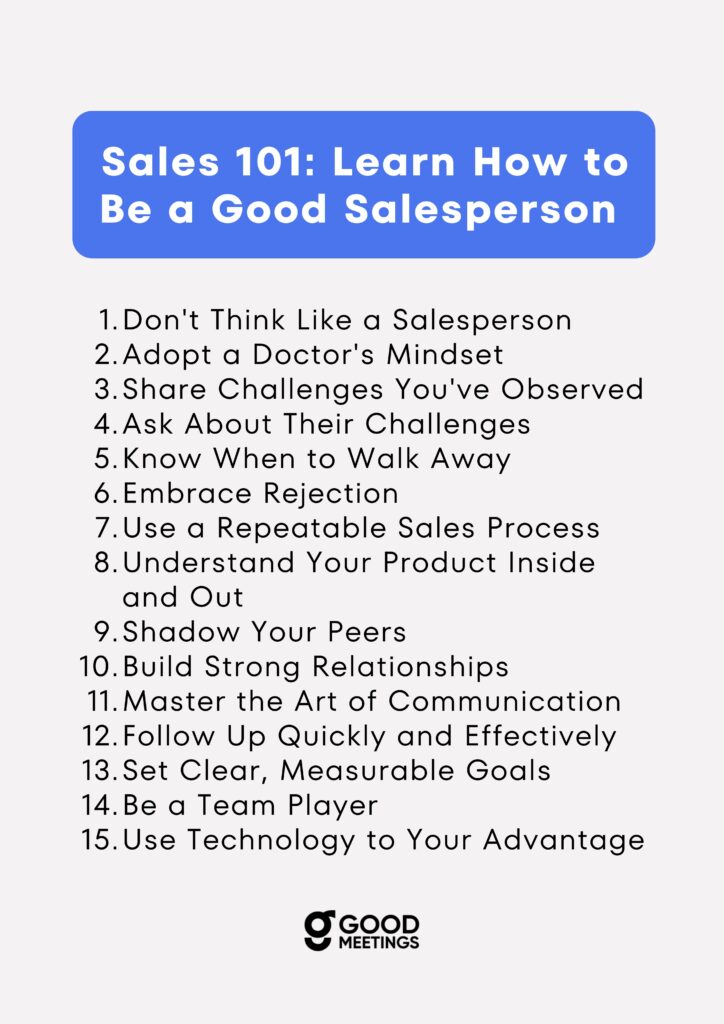Table of contents
Being a successful salesperson is more than just having a natural gift for persuasion or a knack for closing deals. It also involves adopting the right skills, strategies, habits, and mindset.
And, with how competitive the sales world has become today, understanding how to excel in this field is very important.
In this blog post, we’ll explore essential tips and strategies that can help you become a top-notch salesperson.
From understanding your customers to honing your communication skills, we’ll cover everything you need to take your sales game to the next level.
Sales 101: Learn How to Be a Good Salesperson
Aside from offering persuasive pitches, a good salesperson is adept at understanding customer needs, building lasting relationships, and continually adapting to market changes.
In this section, we’ll unveil the secrets to becoming a top salesperson by sharing proven tips and strategies that can elevate your performance.

1. Don’t think like a salesperson
This sounds contradictory, right? After all, you’re in sales, so thinking like a salesperson should be natural.
However, one of the keys to true sales success lies in shifting your mindset. Instead of approaching interactions with the goal of making a sale, focus on understanding and solving your customer’s problems.
This change in perspective can transform the way you connect with potential clients and make your interactions more genuine.
When you prioritize building relationships and providing value over simply closing deals, you not only earn the trust and loyalty of your customers but also naturally boost your sales performance.
Remember, great salespeople act more like consultants—they listen, empathize, and offer solutions that truly meet their clients’ needs.
Related: What is Ideal Customer Profile in Sales – Framework to ICP
2. Adopt a doctor’s mindset
Just as a good doctor takes the time to understand a patient’s symptoms and diagnose the underlying issues before prescribing treatment, a good salesperson must understand their prospects’ pain points before proposing a solution.
This involves asking thoughtful, probing questions to uncover the real challenges and needs of your prospects.
By thoroughly diagnosing their problems, you can offer more precise and effective solutions, much like a doctor provides targeted treatments.
This approach allows you to build credibility and trust, as well as ensure that the solutions you offer are genuinely helpful to your prospects.
Embrace this “diagnostic” approach, and watch your sales interactions become more meaningful and productive!
3. Share challenges you’ve observed
A powerful way to connect with prospects and demonstrate your expertise is by sharing the challenges you’ve observed in their industry. This allows you to capture their attention and show that you understand their pain points.
For instance, if you’re selling a software solution to the retail industry, you might start by highlighting challenges such as:
- managing inventory effectively
- dealing with high employee turnover
- keeping up with rapidly changing customer preferences.
By highlighting these issues, you show that you understand some of the complexities your prospects face and are prepared to offer valuable insights and solutions.
Related: What is a Sales Discovery Call? – Questions, Process and Template
4. Ask about their challenges
While it’s good to share any challenges you think your prospects may have, directly asking them about their specific issues is more important. Doing this allows you to engage them and gain respect as an authority in your field.
When you focus on understanding their specific challenges—rather than just highlighting the features or benefits of your product—you demonstrate that you are genuinely interested in solving their problems.
This approach helps you connect with prospects on a deeper level and tailor your solutions to meet their needs more effectively.
5. Know when to walk away
One of the most important yet often overlooked skills in sales is knowing when to walk away. Not every prospect will be a good fit for your product or service, and that’s okay.
If a prospect doesn’t have challenges that your solution can address, it’s best to disqualify them and focus your efforts on more qualified prospects.
Spending time with the right prospects increases your chances of success and ensures that you’re using your resources wisely.
What’s more, customers will respect and trust you more when you don’t push unnecessary products on them.
By demonstrating integrity and a genuine concern for their needs, you’ll build a reputation as a trustworthy and professional salesperson. This can also lead to more opportunities in the long run.
6. Embrace rejection
Rejection is an inevitable part of the sales process, but how you handle it can significantly impact your success.
Instead of viewing rejection as a personal failure, embrace it as a valuable learning opportunity. Each “no” can provide insights into what might not be working in your approach and what you can improve. By analyzing the reasons behind rejections, you can refine your strategies and become more resilient.
Remember—even the most successful salespeople face rejection regularly. The key is to stay positive, persistent, and open to feedback, using each experience to grow and enhance your sales techniques.
Embracing rejection with a constructive mindset will not only make you a stronger salesperson but also pave the way for future success.
Related: Objection Handling: Ultimate Guide & 5A Framework
7. Use a repeatable sales process
Implementing a repeatable sales process is essential for consistency and success in sales. A structured approach helps ensure that you cover all necessary steps in each interaction, from initial contact to closing the deal.
A repeatable sales process ensures consistency, efficiency, and predictability in your sales activities. It allows you to track what works and identify areas for improvement.
By following a defined set of steps, you can provide a reliable and professional experience for every prospect, ensuring that no opportunity falls through the cracks.
Plus, a repeatable process helps you stay organized, manage your time effectively, and continuously refine your techniques.
Related: What is Sales Acceleration? – Tools and Tactics Included
8. Understand your product inside and out
To be a successful salesperson, you need to have an in-depth understanding of your product. This means knowing every feature, benefit, and potential drawback, as well as how it compares to competitors.
When you’re well-versed in every aspect of what you’re selling, you can confidently answer questions, address concerns, and provide detailed explanations that can help build trust and credibility with your clients.
Also, a thorough knowledge of your product allows you to tailor your sales pitch to highlight the most relevant and compelling points for each customer.
9. Shadow your peers
One of the best ways to improve your sales skills is to learn from those who have already mastered the art.
Observing experienced salespeople in action provides valuable insights into effective sales techniques and strategies.
Pay close attention to how they interact with customers, handle objections, and close deals. Notice the questions they ask, the body language they use, and the way they present solutions.
By shadowing your peers, you can learn practical tips and tricks that are not always covered in training materials.
This hands-on experience allows you to see successful sales tactics in real time, which you can then adapt and apply to your own sales approach.
10. Build strong relationships
Building strong relationships is at the heart of successful sales. When you prioritize genuine connections with your clients, you establish trust and loyalty that go beyond a single transaction.
Strong relationships are built on mutual respect, understanding, and consistent communication. So, take the time to get to know your clients, understand their needs, and show genuine interest in their success.
By providing value and support even when you are not actively selling, you can position yourself as a reliable partner who is invested in their long-term growth.
Related: 10 Effective Ways To Use ChatGPT for Sales Prospecting (Prompts Included!)
11. Master the art of communication
If you want to truly connect with your clients, you need to master both verbal and non-verbal communication skills.
This means being clear, concise, and articulate in your speech, while also being an active listener who can pick up on subtle cues and respond appropriately.
Pay attention to your body language, tone of voice, and facial expressions, as these can convey confidence and sincerity.
You should also tailor your communication style to suit each client’s personality and preferences, ensuring that your message is always relevant and engaging.
12. Follow up quickly and effectively
This next tip will allow you to maintain momentum and demonstrate your commitment to your customers. Prompt follow-up shows that you value their time and are dedicated to addressing their needs.
However, it’s important to strike a balance: be persistent, not pushy. Persistence means regularly checking in, providing additional value, and keeping the conversation going without overwhelming your prospect.
Ensure each follow-up has a purpose—whether it’s to answer a question, provide more information, or simply touch base.
13. Set clear, measurable goals
If you want to achieve success in sales, setting clear, measurable goals is important. Without specific targets to aim for, it’s challenging to stay focused and motivated.
Break down your overall sales objectives into smaller, actionable steps that you can track and measure.
Whether it’s the number of calls you need to make, the meetings you need to schedule, or the deals you aim to close, having concrete goals helps you stay on course and assess your progress.
Related: Sales Pipeline Management: The Ultimate Guide
14. Be a team player
While individual performance is important, the best sales outcomes are often the result of collaborative efforts.
By working closely with your colleagues, sharing insights, and supporting each other, you can create a more dynamic and effective sales team.
This collaboration allows for the exchange of ideas, strategies, and experiences, which can help you overcome challenges and capitalize on opportunities more effectively.
Being a team player also fosters a positive work environment, enhances morale, and builds a culture of mutual respect and support.
15. Use technology to your advantage
Today’s sales environment has become incredibly fast-paced, and leveraging the right technology can give you a significant edge over the competition.
With the help of digital sales tools, you can streamline your workflow and improve your performance.
One such tool is Goodmeetings, an AI-powered platform that can enhance your productivity and help you close deals faster.

Source: Goodmeetings
With its comprehensive suite of features, it allows you to capture meeting intelligence, automate mundane tasks, and access actionable analytics. This way, you can entirely focus on what you do best—selling!
These features include:
- Automatically records, transcribes, and summarizes your sales meetings to capture every discussion and key moment.
- Glean valuable insights from your sales calls to identify trends and improve interactions.
- Improves your follow-up processes by providing automated action items after meetings.
- Offers real-time assistance during meetings through natural language querying and proactive AI alerts.
- Enables seamless sales rep coaching with AI-based nudges and battlecards, as well as live human coaching.
- Allows you to engage with clients globally through multi-language support.
- Provides a searchable library of video meetings that reinforces best practices and highlights successful tactics for training and review.
- Integrates with schedulers, video conferencing platforms, CRM systems, and more to streamline your entire sales workflow.
- Provides you with a complete picture of your customer, including their name, designation, and previous interactions with your business to help you personalize your approach.
- Helps you generate scores and qualify leads based on responses from AI-generated Q&As.
- Provides client, competitor, and sales rep performance dashboards.
Want to get started with Goodmeetings? You can sign up for free and enjoy a 7-day free trial or opt for the free demo to see how it works.
Elevate Your Sales Performance With Goodmeetings
Related: Complete Guide To Conversational AI for Sales
16. Be adaptable
The sales landscape is constantly changing, with new products, market trends, and customer needs emerging all the time.
To thrive, you must be flexible and willing to adjust your strategies. This means staying informed about industry developments, being open to feedback, and continuously refining your approach.
An adaptable salesperson can tailor their pitch to different customers, pivot when faced with objections, and find creative solutions to challenges.
By embracing change and being proactive in your learning, you can stay ahead of the competition and meet your customers’ evolving needs more effectively.
Related: The Future of Sales: Will AI Replace Salespeople?
17. Manage your time well
With numerous tasks and responsibilities vying for your attention, it’s crucial to prioritize your activities to maximize productivity.
Start by setting clear, achievable goals and breaking them down into manageable tasks. Use tools like calendars, to-do lists, and productivity apps to stay organized and keep track of deadlines.
It’s also important to avoid getting bogged down by unproductive activities and focus on high-value tasks that directly contribute to your sales objectives.
Remember, managing your time well also means balancing work and personal life to avoid burnout and maintain long-term effectiveness.
18. Ask for referrals
Once you’ve built strong relationships with your customers, don’t hesitate to ask for referrals.
Satisfied customers are often willing to recommend your services to others, but they might not think to do so unless prompted.
Asking for referrals is a powerful way to expand your network and reach new prospects who already have a level of trust in you, thanks to the recommendation.
Ideally, you should approach this delicately and at the right time—usually after a successful sale or positive feedback. 💡
Pro tip: Make it easy for your customers by providing referral materials or a straightforward process for them to follow.
Qualities That Make a Great Salesperson
To become a great salesperson, it’s important to embody certain qualities that can build strong relationships, foster trust, and drive success.
Some of these key qualities include:
1. Charisma
Charisma is the magnetic charm or appeal that draws people in. A charismatic salesperson can easily engage with potential clients, making them feel comfortable and valued.
This quality helps in building strong relationships, which are crucial for long-term success in sales.
Charismatic individuals often leave a lasting impression, making customers more likely to remember and choose them over competitors.
Related: 10 Best Sales Engagement Platforms to Boost Your Sales Performance in 2024
2. Confidence
Confidence is crucial in sales because it instills trust in your customers. When you believe in yourself and your product, it shows.
A confident salesperson can present their product convincingly, handle objections effectively, and close deals with ease.
Confidence also helps in navigating difficult conversations and maintaining a positive demeanor, even in challenging situations. It enables you to assertively guide the sales conversation, ensuring that you stay in control while also making your customers feel secure in their decisions.
This quality is contagious; when you exude it, your customers are more likely to feel confident in their choice to buy from you.
3. Passion
A passionate salesperson is driven by a genuine belief in what they are offering and an excitement to share its benefits with others.
This enthusiasm is not only persuasive but also inspires confidence in the customer that they are making a good choice.
Passionate salespeople often go the extra mile to understand their products and find the best ways to meet their customers’ needs. Their dedication can lead to stronger customer loyalty and better long-term sales outcomes.
Related: Sales Intelligence 101 – Definition, Tools and Best Practices
4. Honesty
Honesty builds trust, which is the foundation of any successful sales relationship. Being transparent about what your product can and cannot do helps set realistic expectations and fosters a sense of integrity.
Customers appreciate honesty and are more likely to return to and recommend a salesperson who is straightforward and trustworthy.
Honesty involves acknowledging limitations, admitting mistakes, and being transparent about pricing and terms.
This quality ensures that customers feel respected and valued. In the long run, it also can lead to more referrals and repeat business as customers feel confident in your integrity.
5. Positive attitude
A positive attitude is essential for maintaining motivation and resilience in the face of challenges. Sales can be a tough field, with frequent rejections and setbacks.
A salesperson with a positive outlook can stay focused on their goals and keep pushing forward, even when things don’t go as planned.
Positive salespeople are often seen as more approachable and easier to work with, which can make a big difference in customer interactions.
6. Empathy
Empathy is the ability to understand and share the feelings of others. A great salesperson can put themselves in the customer’s shoes, understanding their needs, concerns, and motivations.
This emotional intelligence allows them to tailor their approach to each individual and create a more personalized & effective sales strategy.
Related: How Does Emotional Intelligence Help in Closing More Deals?
7. Attentiveness
Attentiveness is the quality of being observant and responsive to the customer’s needs and feedback.
A good salesperson listens more than they talk and pays close attention to what the customer is saying.
By being attentive, salespeople can better address customer concerns and provide solutions that are truly aligned with their needs.
8. Thoroughness
Thoroughness involves being diligent and meticulous in every aspect of the sales process. Great salespeople leave no stone unturned, ensuring that they have all the necessary information to provide the best possible service.
This quality helps in preparing for meetings, following up on promises, and delivering exceptional customer experiences.
Being thorough shows that you are professional and committed to excellence. It involves doing your homework before meeting with customers, understanding their business and industry, and being prepared to answer any questions they might have.
Related: Mastering Sales Demos: The Ultimate Guide to Winning & Closing More Deals
Wrapping Up
In conclusion, becoming a good salesperson is a journey that involves continuous learning and adaptation.
By implementing the tips, strategies, and advice outlined in this blog post, you can effortlessly enhance your skills and achieve your professional goals.
Finally, always remember that success in sales isn’t merely about closing deals; it’s about building trust, delivering value, and creating lasting customer relationships.





